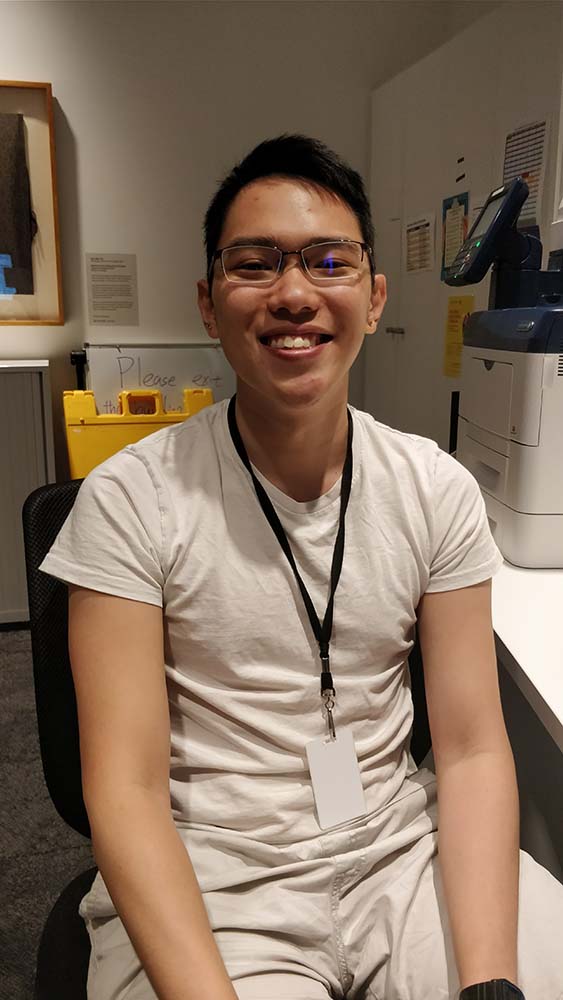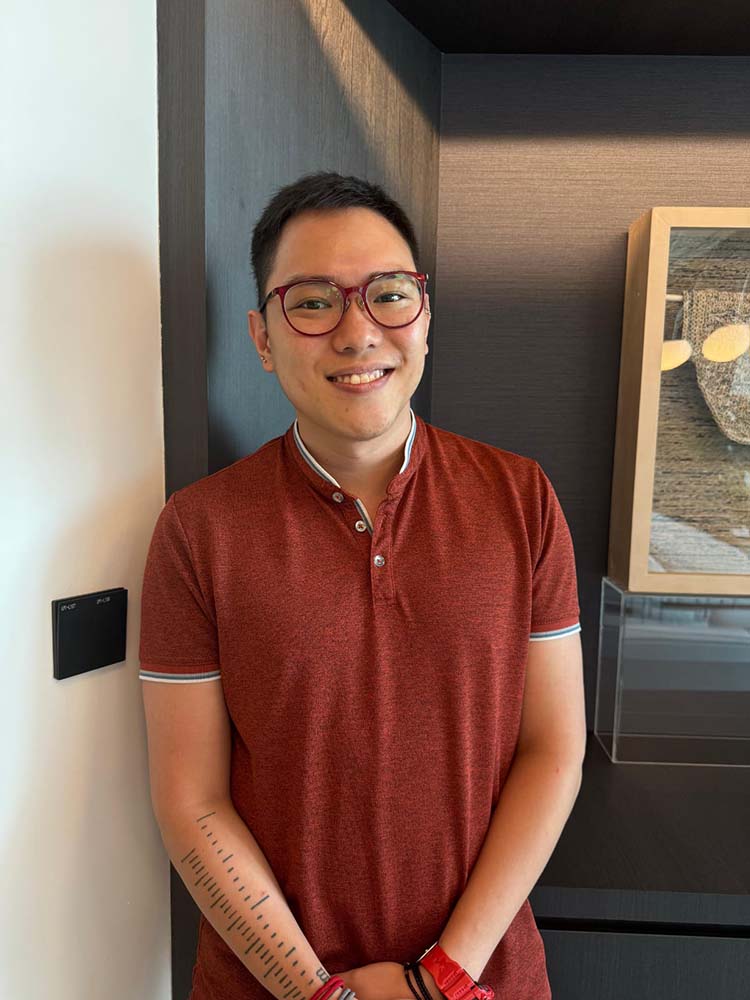From Silent Struggles To Public Advocacy: How Edwin Chaw Is Breaking Mental Health Stigmas In The Workplace
Google the name “Edwin Chaw”, and you’ll see that the first results are articles covering his personal struggles: his childhood marked by abuse; his struggle with depression, anxiety, and post-traumatic stress disorder; and his experiences as a “dropout” from the Integrated Programme at Hwa Chong Institution.
Far from hiding his past, Edwin, 32, now a compliance officer in the finance industry, has become an advocate for mental health transparency, even at his workplace, where he disclosed his issues with his employer upfront.
But his journey, while well-publicised, began in silence. Growing up in a tumultuous environment marked by parental strife and abuse from his family’s helper, Edwin internalised his struggles, believing he had no safe space to share his pain. "For the longest time I felt like I couldn’t approach an adult with my problems," he reflects, recalling how his family helper’s actions compounded his fear of seeking help.
“I used to leave the house to sit in the void deck where it was peaceful, and ended up befriending the community cats,” he says. “I’d sit at the tables in the void deck where the cats would curl into my lap as I studied, which brought me a lot of comfort. I ended up developing a huge love of cats!”

Edwin during his university days | IMAGE: EDWIN CHAW
It wasn’t until he was diagnosed with depression and anxiety at 18 that Edwin started to find a sense of direction for recovery. Even then, he feared the consequences of being open about his mental health, worrying that his diagnosis would follow him in future job applications or that it might affect how others perceived him. This fear lingered for years, even as he started experiencing symptoms of post-traumatic stress disorder at 26, a condition that required intensive therapy but also reinforced his determination to seek help and keep moving forward.
Even though he calls PTSD therapy one of the hardest things he’s ever done, Edwin says that being open to seeking help made the diagnosis less disruptive than his previous diagnoses.
“I didn’t need to call a time-out for my life this time. I completed my final year of University while still working part time on weekends and weekday nights. Make no mistake, it wasn’t easy, and I definitely did suffer, but this time I relied heavily on my friends and colleagues around me who showed me the utmost love and kindness in supporting me, stepping in to help with school assignments and cover shifts when I really couldn’t cope,” Edwin says, crediting them with helping him move toward recovery.
Today, as a Beyond the Label (BTL) ambassador, Edwin is not only transparent about his own mental health journey but is also passionate about encouraging others to do the same in professional settings. His role as an ambassador involves educating the public about mental health, fostering support within communities, and breaking down stigmas that prevent people from seeking help.

IMAGE: EDWIN CHAW
Facing his fears at work
Edwin’s decision to disclose his mental health conditions to his employer was a pivotal moment in his advocacy. He had worked in both supportive and non-supportive environments, and he quickly noticed the difference. "When I had openly disclosed my conditions and struggles, that fear dissipated, or at least was far more reduced," Edwin shares. “I knew that if or when the mental health crisis hit, I would be supported, not judged.” This openness allowed his employer to work with him, ensuring that his workload could be managed in ways that wouldn’t trigger a severe mental health episode.
However, in workplaces where Edwin didn’t feel safe to open up, the fear of his mental health slipping perpetuated the cycle of anxiety.
“When I didn’t feel safe enough to disclose my conditions, my fear was instead magnified. The fear itself became yet another source of stress I had to manage. Of course, this constant fear only further worsened my mental health, which amplified my fear, which worsened my mental health, which amplified my fear…”
His decision to be transparent about his mental health at work eventually led to giving a mental health talk to his colleagues, a daunting but empowering experience.
“Truth be told It’s really daunting to share in that context. Not saying it should be so, but I believe for the most part at present we collectively have accepted that there exists a divide between your work self and your ‘real’ self, and your mental health struggles are placed in the ‘real’ self box. To even mix my work self with my ‘real’ self felt almost like an unspoken violation.”
“It’s tough sharing about your mental health struggles to begin with, even with friends, and it does get harder with colleagues who may not know you as intimately as do your friends. I had concerns as well that knowing this information about me would change how my colleagues perceived and treated me as a person, that they’d be judgemental or dismissive.”
“What did help a lot though was seeing the reactions on my colleagues’ faces in real-time. On their faces I saw a mixture of sympathy, empathy, and understanding, but not disgust, which gave me the encouragement I needed to continue. The sharing was also a two-way dialogue, so as colleagues asked questions in turn, I got the sense that they were able to relate to bits and bobs here and there, and that such concerns weren’t taboo but just a normal albeit less often spoken about part of life.”
“I think knowing of my past and my struggles also helped contextualise some of my own shortcomings, so my employer afforded me more patience in overcoming them so long as I also put in the effort to get better myself.”
 IMAGE: EDWIN CHAW
IMAGE: EDWIN CHAW
Healing through connection
A major turning point in Edwin’s mental health journey came when he started opening up to friends and family about his struggles. While he had spent much of his youth bottling up his emotions, fearing that no one would understand or be able to help, he eventually realized the healing power of connection. "By opening up to friends and family, I was able to see things from a different perspective. They helped to identify and correct my biases and stuck points," he says. This support system proved invaluable as he navigated the challenges of adulthood, from completing his university studies to managing his PTSD while working part-time.
Therapy, in particular, played a critical role in helping him identify and break free from negative thought patterns that had hindered his recovery for years. "It really helps to have a professional make you aware of all the thought patterns that have become subconscious and habitual," he explains.
Edwin is hopeful that his openness, along with the openness of others sharing their mental health stories, will help shift workplace culture toward greater understanding and support, especially since mental health challenges can be exacerbated by workplace stressors, such as unreasonable deadlines and high-pressure environments.
“I do harbour a hope that increased transparency and recognition of mental health also means a culture where we recognise the effect that our words and deeds have on the mental health of others. Will this result in workplaces where employees flourish in a kinder, considerate environment? Only time, and ourselves, can tell.”
For Edwin, the key to creating lasting change in workplace policies is the recognition of mental health as a real issue with formalised accommodations.
“Think about a physical ailment like a broken limb,” he says. “Workplace guidelines tend to be fairly clear about the entitlements of the employee in these situations. It would be grand if there was a way to extend that to mental health and mental conditions as well. Of course, there will be some difficulty on a policy level because mental health and conditions can be seen as idiosyncratic, with needs and recovery timelines potentially unique to each individual, so the policies will need to bake in some level of flexibility. (Then again, can we not say the same of physical illnesses?).”
“Regardless, I think it would still be good to at least have an outline to work off of, with individual needs subject to negotiation between employee and employer.”
 Edwin recently shared his story at Beyond The Label Fest in September | IMAGE: TOUCH COMMUNITY SERVICES
Edwin recently shared his story at Beyond The Label Fest in September | IMAGE: TOUCH COMMUNITY SERVICES
Advice for others
Looking back on his own journey, Edwin offers practical advice for those struggling with mental health. "Don’t be afraid of considering therapy or medication," he says, emphasising that mental health conditions, like physical ailments, require proper treatment and can be managed with the right support. He encourages people to see medication not as a permanent solution but as a tool to help manage symptoms while they work on the underlying causes through therapy or lifestyle changes.
In professional settings, Edwin reminds others that mental health challenges don’t have to hold you back. "Your mental health challenges are just that—challenges, not permanent limiters.”
For the latest updates on Wonderwall.sg, be sure to follow us on TikTok, Telegram, Instagram, and Facebook. If you have a story idea for us, email us at [email protected].










